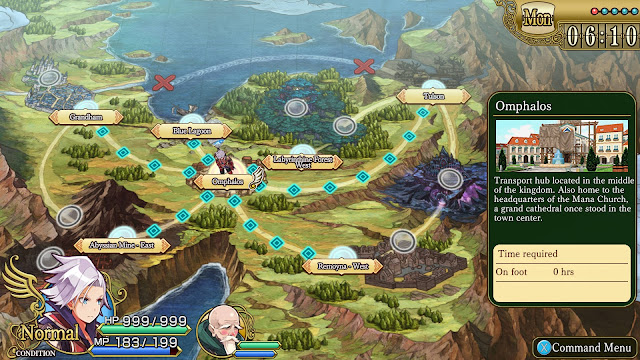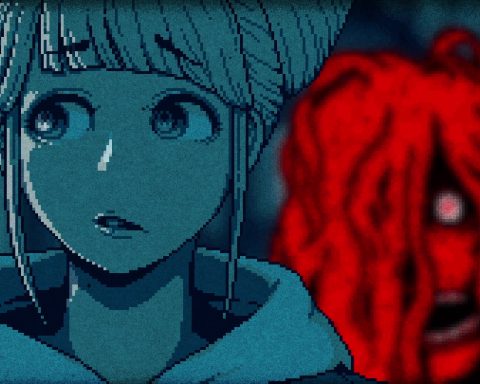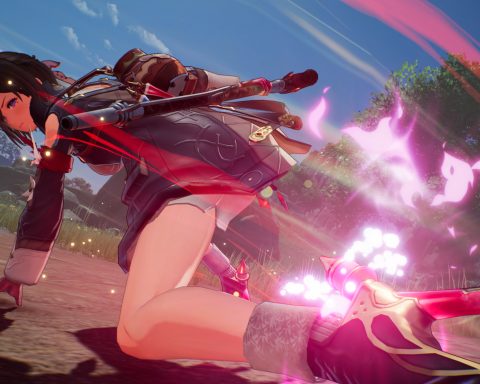Review by Matt S.
Hero Must Die has one of the most interesting premises you’ll ever see in a JRPG. It’s almost distressing that it struggles so completely to execute against that potential, and the reason is simple: It stubbornly sticks to being a JRPG. The attempted gamification of the game’s themes to this particular genre have close to ruined it.
You play as a hero who, in the opening minutes, manages to put down a great demon that has come close to destroying humanity. JRPGs that start at their end (i.e. the final boss) are by no means unusual, however what is unusual for this one is that the hero also perishes in the final conflict. As a reward for saving humanity for annihilation, an angel restores the hero to life, but with one unfortunate caveat – he will die, for good, in just five days.
What you do with the time given to the hero is really up to you. You can tie up loose ends with your former allies and friends, help rebuild the kingdom that was devastated in the war with the demon, deal with the few remaining beasts that followed the demon in battle… or you can while away your time fishing. The goal most people will chase will be the opportunity to have a final tryst with the hero’s great love, but there’s an unfortunate catch there – no one knows where she is. For the hero to say his goodbyes to her, he’s going to have to scramble against time to track her down.
Asking yourself what you’d do with your time left on the planet if you knew when it’s going to end is by no means an uncommon hypothetical. It’s a good mental exercise to remind us that we’re mortal, because we all tend to believe we’ve got all the time in the world in front of us until we don’t. As the story goes the genesis of Hero Must Die was the creator watching a loved one go through a terminal illness. That’s partly what makes it so hard to be critical of this game – in addition to being a superb concept, it’s also obvious at every stage that the melancholic tone that the narrative aims for is something deeply personal. Unfortunately, not nearly enough is actually done to explore this concept. Time moves fast enough in the game that it’s over far too soon, and while the end scene is that of a funeral with various people breaking down in tears, it’s a scene that falls flat because the narrative doesn’t do nearly enough to establish the emotional connections that would lead the characters to care for the hero – we’re told they’re close friends, but they never behave like it.
In fact, most of them just want to throw more quests at our hero, and chew up his time by sending him on simple tasks like raising funds to fix a church, or heading into dungeons to track down magic orbs. All of this is done in the context of the world needing to recover after being devastated by the war with the demons, and I get that, but you would think that a grateful kingdom and close friends would put that aside for a couple of days to help the hero that saved them all live out his time in comfort and happiness. At the very least they should do what they can to help him find his lost love… and then get out of the way and let the two have their time together. Hero Must Die has a real tonal dissonance where the hero is left doing the same stuff that all JRPG heroes do, out of the same sense of obligation, but no real reason for him to do so.
Perhaps there’s a coded message in there. Perhaps this game is a reflection on increasing pressure that society is putting on its seniors to work right to the end. Perhaps it’s an observation that the younger generations are not having children and unable to handle the management of the planet themselves so seniors aren’t getting their own proverbial five days. Perhaps that’s what the game’s trying to say, but it doesn’t come across that way. In practice it simply feels like the developers were laboured with the need to throw JRPG features at players – the need to go through dungeons and fight enemies on behalf of quest-givers – otherwise there’s not much left to the JRPG genre. As I mention in my accompanying video on the game, even the combat system feels at odds with the game’s intent. When you’ve only got five days left, the relentless grind of minor enemies on the way to the boss comes across as arbitrary. If you wanted the hero to tie up lose ends, the boss battle itself would have been sufficient.
There are mechanical features that are interesting. The hero actually loses power as time goes on. At the start of the first day he’s basically able to wipe the floor with anything on a single attack. By the end of the fifth day, he’s barely able to fight. By then you’ll need a party of other allies, all levelled up, to protect the hero in his decrepit state. It’s this mechanic that the game bases its claim that it’s an “anti-RPG” on. That’s not really true, as all the other characters do gain experience, level up, and become more powerful as standard for the genre. But it certainly speaks to the thematic parallel to the way modern society exploits the elderly right to the end. Even as their bodies break down, they’re still being called on to roll up the sleeves and do their bit in metaphoric “battle.”
Each play through of Hero Must Die lasts for only a couple of (real world) hours, and the clock does tick down in real time, so there’s a hard limit on what you can get done in a single run. Naturally you’re encouraged to replay and make different decisions to see the different ways that your heroes last days might play, but there’s a mechanic incentive to replay, too, and it’s a weird decision – you get a score, as though this is some kind of arcade game. Once again, it’s mechanics getting in the way of theme. If you’re making decisions to max out your score, because this is a video game, then you’re not being encouraged to feel empathy and make decisions based on the narrative being told.
Hero Must Die has a lot going for it – a strong, immediately compelling theme, a lovely, melancholic aesthetic, and a simple elegance to its systems. Unfortunately, the development team really struggled to find a way to marry the form and function of the JRPG, and the narrative that the mechanics are meant to support. That conflict means that Hero Must Die is nowhere near as memorable and potent as it should be. As a retro-styled little indie JRPG it’s certainly made better than most, and it’s perfectly entertaining in its own way, but as a powerful experience that makes us muse on our mortality, it’s almost painful how far this one misses the mark.
– Matt S.
Editor-in-Chief
Find me on Twitter: @mattsainsb










